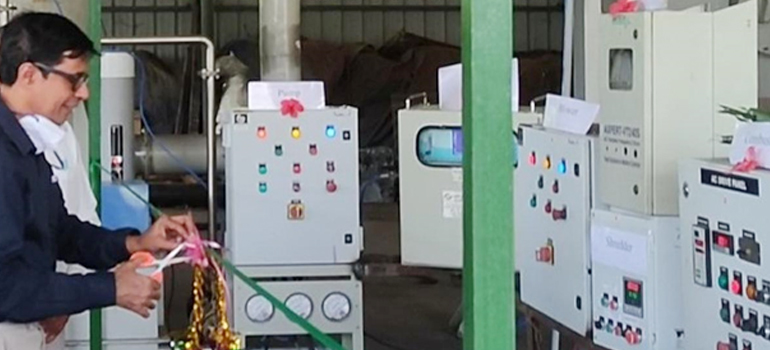
A municipal solid waste combustor developed by the Indian Institute of Technology-Madras (IIT-M) was commissioned at the Bharat Heavy Electricals Limited (BHEL) campus here on Friday.
The unit, developed by IIT-M researchers at its National Centre for Combustion Research and Development (NCCRD), can process up to one tonne of unsegregated municipal solid waste (MSW) per day. It generates steam as the main output along with clean gaseous emissions and ash as a by-product. The initiative was part of the Ucchatar Avishkaar Yojana funded by BHEL and the Union Ministry of Education.
The indigenously developed pilot plant, set up at the Combined Cycle Demonstration Plant at BHEL, is based on ‘rotary furnace technology’ to efficiently process unsegregated municipal solid waste. The combustor uses a sieve mesh to segregate the inert particles on-the-fly while sustaining the combustion of the heterogeneous waste. It has been tested at IIT-M for a variety of mixed wastes and up to 40 per cent moisture in the feedstock. The plant also includes emission treatment units, including a bag filter, wet scrubber and dry scrubber, to filter and capture the pollutants ensuring emissions were well within the norms, according to a press release from IIT-M.
“Waste management is becoming an important issue that needs solutions that can be scaled up and help quick and safe disposal. The first-of-its-kind solid waste combustor developed by IIT Madras not only addresses the scale and safe disposal issues, but also generates heat resulting in a waste-to-wealth creation,” said V.Kamakoti, Director, IIT-M, who inaugurated the plant in the presence of BHEL officials and faculty members of IIT-M.
R.Vinu, Associate Professor, Department of Chemical Engineering, IIT-M, who led the project said: “The initial phase of testing with a smaller scale rotary combustion unit at NCCRD with several grades of wastes gave us huge confidence in building the improved full-scale unit with efficient emission control at BHEL. The data from this unit in BHEL will help us to systematically scale-up the process in both distributed and centralised manner.”
According to estimates, the total solid waste generation in Tamil Nadu was 14,600 tonnes a day including 5,400 tonnes generated in Chennai. More than 2,500 tonnes/day of bio-inorganic wastes, including plastics and high calorific value matter, are dumped in landfills. Indian municipal solid waste is heterogeneous and complex with high moisture, low calorific value and high inerts. Existing incineration systems do not involve energy recovery and result in toxic emissions. The IIT-M designed incineration system addresses most of these challenges, the release said.
BHEL would carry out various tests and optimise its operations for future scale-up and market this as a reliable and user-friendly product, the release added.
Original News Link
https://www.thehindu.com/news/cities/Tiruchirapalli/tiruchi/article65466942.ece